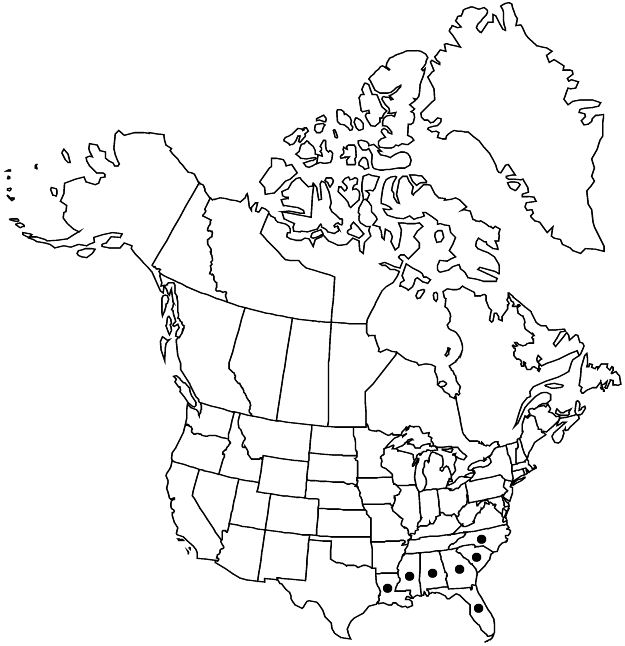Difference between revisions of "Hypericum suffruticosum"
Rhodora 63: 15. 1961.
FNA>Volume Importer |
imported>Volume Importer |
||
| (6 intermediate revisions by 2 users not shown) | |||
| Line 11: | Line 11: | ||
|label=Endemic | |label=Endemic | ||
}} | }} | ||
| − | |basionyms={{Treatment/ID/ | + | |basionyms={{Treatment/ID/Basionym |
|name=Ascyrum pumilum | |name=Ascyrum pumilum | ||
|authority=Michaux | |authority=Michaux | ||
| + | |rank=species | ||
| + | |publication_title=Fl. Bor.-Amer. | ||
| + | |publication_place=2: 77. 1803, | ||
}} | }} | ||
|synonyms={{Treatment/ID/Synonym | |synonyms={{Treatment/ID/Synonym | ||
|name=A. pauciflorum | |name=A. pauciflorum | ||
|authority=Nuttall | |authority=Nuttall | ||
| + | |rank=species | ||
}} | }} | ||
|hierarchy=Hypericaceae;Hypericum;Hypericum sect. Myriandra;Hypericum suffruticosum | |hierarchy=Hypericaceae;Hypericum;Hypericum sect. Myriandra;Hypericum suffruticosum | ||
| Line 33: | Line 37: | ||
|elevation=0–200 m | |elevation=0–200 m | ||
|distribution=Ala.;Fla.;Ga.;La.;Miss.;N.C.;S.C. | |distribution=Ala.;Fla.;Ga.;La.;Miss.;N.C.;S.C. | ||
| − | |discussion=<p>Hypericum suffruticosum is near the “cuneifolium” form of H. crux-andreae; it differs, among other things, by the two-merous ovary, the relatively small or absent inner sepals, the pedicels recurved or reflexed in fruit, and the cushion or matted habit.</p> | + | |discussion=<p><i>Hypericum suffruticosum</i> is near the “cuneifolium” form of <i>H. crux-andreae</i>; it differs, among other things, by the two-merous ovary, the relatively small or absent inner sepals, the pedicels recurved or reflexed in fruit, and the cushion or matted habit.</p> |
|tables= | |tables= | ||
|references= | |references= | ||
| Line 42: | Line 46: | ||
-->{{#Taxon: | -->{{#Taxon: | ||
name=Hypericum suffruticosum | name=Hypericum suffruticosum | ||
| − | |||
|authority=W. B. Adams & N. Robson | |authority=W. B. Adams & N. Robson | ||
|rank=species | |rank=species | ||
| Line 57: | Line 60: | ||
|publication year=1961 | |publication year=1961 | ||
|special status=Endemic | |special status=Endemic | ||
| − | |source xml=https:// | + | |source xml=https://bitbucket.org/aafc-mbb/fna-data-curation/src/2e0870ddd59836b60bcf96646a41e87ea5a5943a/coarse_grained_fna_xml/V6/V6_143.xml |
|genus=Hypericum | |genus=Hypericum | ||
|section=Hypericum sect. Myriandra | |section=Hypericum sect. Myriandra | ||
Latest revision as of 22:19, 5 November 2020
Shrubs, erect and branched from near base, forming cushion, or decumbent and matted, 0.5–2 dm. Stems: internodes 4-lined at first, soon 2-winged. Leaf blades elliptic or oblong-linear to narrowly obovate or oblanceolate, 3–10 × 1–3 mm, base not articulated, rounded to cuneate, without glandlike auricles, margins plane to subrecurved, apex obtuse, midrib unbranched. Inflorescences 1-flowered, often with pseudodichotomous branches from apical node, without proximal branches; pedicels mostly recurved to reflexed in fruit, bracteoles proximal. Flowers 10–15 mm diam.; sepals persistent, enclosing capsule, (2 or) 4, unequal, outer broadly ovate to broadly elliptic, 4–8 × 4–8 mm, apex obtuse to rounded, inner none or minute; petals 4, pale yellow, narrowly obovate, often unequal, 4–8 mm; stamens persistent, 30; ovary 2-merous. Capsules cylindric-ellipsoid, 3–5 × 2–3 mm. Seeds scarcely carinate, 1 mm; testa finely reticulate. 2n = 18.
Phenology: Flowering spring–early summer (Mar–Jun).
Habitat: Dry, open, sandy pinelands, coastal plain
Elevation: 0–200 m
Distribution

Ala., Fla., Ga., La., Miss., N.C., S.C.
Discussion
Hypericum suffruticosum is near the “cuneifolium” form of H. crux-andreae; it differs, among other things, by the two-merous ovary, the relatively small or absent inner sepals, the pedicels recurved or reflexed in fruit, and the cushion or matted habit.
Selected References
None.